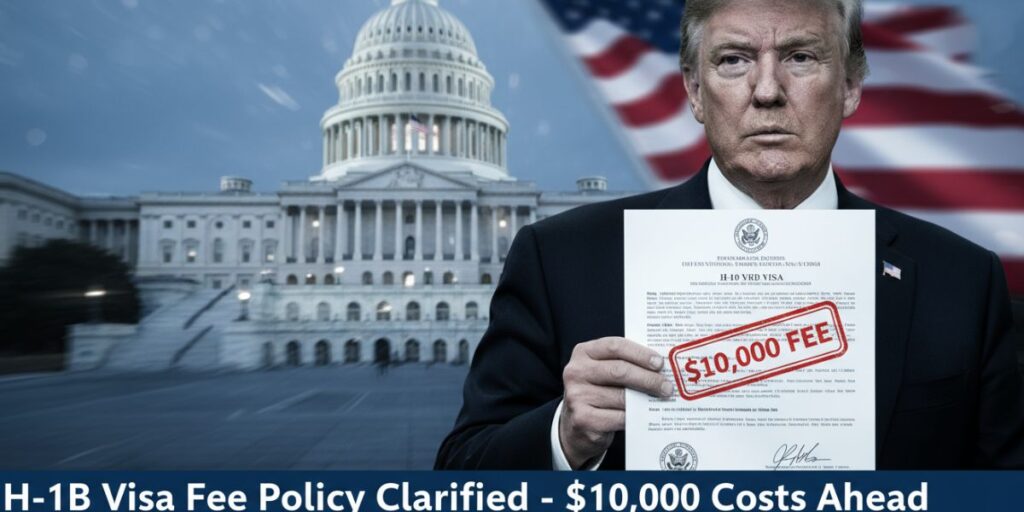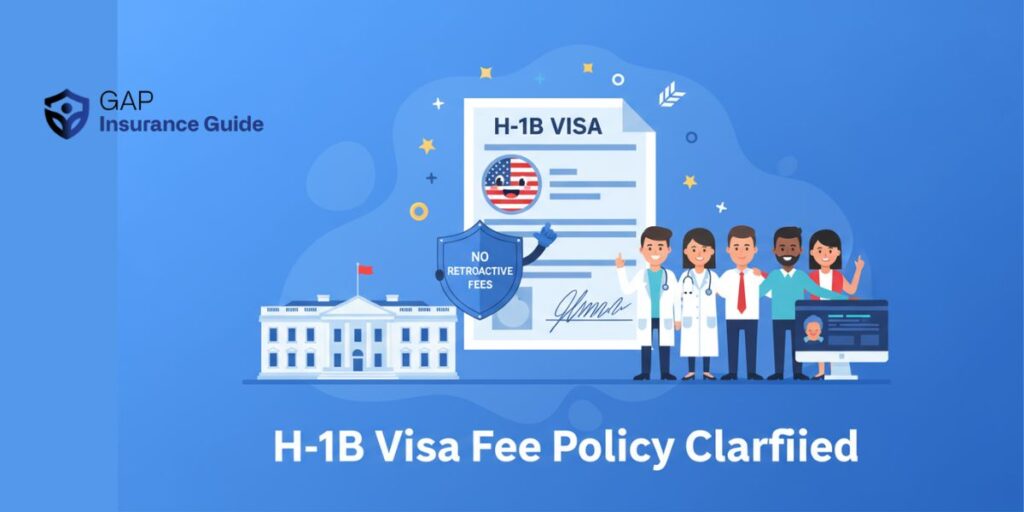Introduction
The White House has clarified its position on the recently announced H-1B visa fee increase, confirming that the new charges will not apply retroactively to existing visa holders. This announcement comes amid growing concern among skilled foreign workers and U.S. employers who rely on the H-1B program to fill specialized roles in technology, engineering, healthcare, and other sectors.
The clarification aims to reassure both applicants and employers that the additional costs will only affect future filings, not individuals who are already in the United States on valid H-1B visas.
Background on the H-1B Visa Program
The H-1B visa is a non-immigrant work permit that allows U.S. employers to hire foreign workers in specialty occupations that require theoretical or technical expertise. Each year, the U.S. Citizenship and Immigration Services (USCIS) runs a lottery system due to the overwhelming number of applicants compared to the annual cap of 85,000 visas.
Traditionally, the H-1B program has been a critical tool for technology companies, universities, and research institutions. According to the National Foundation for American Policy (NFAP), H-1B holders contribute significantly to innovation, patents, and job creation in the U.S.
The New Fee Policy Explained
Earlier this year, the administration announced increased fees for H-1B visa applications as part of a broader strategy to modernize immigration processing and reduce backlogs. The new structure includes:
- Higher registration fees for lottery entries
- Increased petition filing fees for employers
- Additional surcharges to fund asylum programs and other USCIS operations
The policy sparked concerns among foreign workers already in the U.S. Many feared they would be asked to pay the new fees retroactively during their visa extension or transfer process.
However, the White House confirmed last week that current visa holders will not be subject to retroactive charges. Instead, the fee increases will apply only to new applications and petitions filed after the policy takes effect.
Official Statement from the Administration
A White House spokesperson emphasized:
“The new H-1B visa fee adjustments are designed to improve the efficiency of the immigration system and ensure adequate funding for processing. However, these changes will only apply to new applicants and petitions filed moving forward. Current H-1B holders will not be retroactively charged.”
This statement was welcomed by immigration lawyers and advocacy groups, many of whom had urged the administration to clarify the scope of the policy.
Reactions from Stakeholders
1. Immigrant Workers
For thousands of workers in tech hubs like Silicon Valley, Seattle, and Austin, the news provides relief. Retroactive charges would have placed additional financial strain on families already facing high living costs and uncertainty around permanent residency pathways.
One H-1B holder, a software engineer at a Fortune 500 company, told reporters:
“We were worried about whether we’d suddenly have to pay thousands of dollars in new fees just to maintain our legal status. This clarification is a huge relief.”
2. Employers
Large technology firms such as Google, Microsoft, and Amazon, which employ significant numbers of H-1B workers, had also expressed concern. Increased costs for visa renewals could have raised operational expenses, particularly for companies sponsoring hundreds of employees annually.
Industry groups like the U.S. Chamber of Commerce praised the clarification, stating that predictable and fair policies are crucial for businesses that rely on global talent.
3. Immigration Attorneys
Legal experts highlighted that while the clarification is welcome, employers and workers must remain vigilant. The new fees will still significantly increase the cost of hiring new talent, and firms will need to budget accordingly.
Immigration attorney Priya Patel commented:
“The clarification avoids unnecessary chaos, but the broader fee hikes will still reshape how employers approach hiring foreign workers. Smaller companies, in particular, may find the costs prohibitive.”
Economic and Policy Implications
The H-1B program is often at the center of debates over U.S. immigration policy. Supporters argue that it helps fill critical skill shortages and keeps the U.S. globally competitive. Critics contend that it may suppress wages for American workers or lead to overreliance on foreign labor.
With the updated fee structure, the administration aims to:
- Generate additional revenue to fund USCIS operations
- Balance the demand for visas with the cost of processing
- Address growing political pressure to modernize the immigration system
However, experts warn that higher costs could deter startups and smaller firms from sponsoring workers, consolidating opportunities within large corporations that can afford the fees.

What This Means for Current H-1B Holders
If you are an H-1B holder currently working in the U.S., here are key takeaways:
- No retroactive charges: You will not be asked to pay new fees for past filings.
- Extensions & transfers: When you apply for an extension or change employers, you may still face updated filing fees (depending on implementation timelines).
- Path to green card: The fee clarification does not affect long-term immigration pathways such as employment-based green cards.
For employers, this means immediate cost stability for their existing workforce but higher future costs for new hires.
Broader Immigration Context
The clarification comes at a politically sensitive time, with immigration policy under intense scrutiny ahead of the 2024 election cycle. While the H-1B program garners bipartisan attention, it often serves as a flashpoint in larger debates over U.S. labor, wages, and immigration reform.
The administration’s decision to exempt current visa holders from retroactive fees may be an attempt to balance:
- Fairness toward existing immigrants
- Revenue needs of USCIS
- Political optics around immigration policy
Looking Ahead
The rollout of the new fee structure will be closely watched by both immigrant communities and U.S. employers. Key questions remain:
- How high will the new filing fees climb compared to the old structure?
- Will fee increases affect the number of employers willing to sponsor foreign talent?
- Could this push more skilled workers to seek opportunities in countries like Canada, which recently expanded its skilled immigration programs?
Experts suggest that while the clarification provides immediate relief, the long-term effects of higher costs may reshape the landscape of U.S. immigration.
Conclusion
The White House’s clarification that the new H-1B visa fees will not apply retroactively is a significant relief for current visa holders and U.S. employers. While the broader fee increases remain controversial, this decision underscores the administration’s attempt to strike a balance between funding immigration services and maintaining fairness for those already in the system.
As the U.S. continues to compete globally for skilled talent, the handling of the H-1B program will remain a key indicator of how immigration policy adapts to economic and political pressures.
Disclaimer: The content published on Gap Insurance Guide is intended for general information and educational purposes only. We cover topics related to insurance, banking, finance, and trading, but none of the material should be considered financial, legal, or investment advice. While we aim to provide accurate and up-to-date information, we make no guarantees about completeness, reliability, or accuracy. Any actions you take based on our content are strictly at your own risk, and Gap Insurance Guide will not be liable for any losses or damages. We strongly recommend consulting a licensed financial advisor, insurance expert, or other qualified professional before making decisions. Articles may include links to third-party websites, and we are not responsible for their content or practices.
I’m Abhilash, a finance and business content writer passionate about simplifying money matters. I share practical insights on finance, business growth, and insurance to help readers make informed decisions. Through my blogs and articles, I aim to provide clear, reliable, and actionable advice for smarter financial planning and success.


